Jan. 6 anniversary points to bigger fights ahead for democracy: ANALYSIS
An ABC News/Ipsos poll shows 71% of Republicans believe Trump's false claims.
Amid the chaos and destruction of last Jan. 6, as he huddled with colleagues and aides in a stunningly vulnerable U.S. Capitol, Sen. Tim Kaine had an insight that he shared with a few confidantes: This was either the end of something, or just the beginning.

Homegrown: Standoff to Rebellion
A look at the days, events and conversations leading up to Jan. 6, 2021, from the eyes of anti-government groups, extremism experts and several ABC News correspondents who were at the Capitol that day.
Donald Trump’s presidency seemed to be fizzling in almost "poetically perfect" fashion, Kaine would later say, with Trump’s followers engaged in a horrific assault on democracy that might expose the movement for what Kaine and many others long believed it to be.
That is, unless the chants and clashes lawmakers heard in a deadly blur of a day were mere warnings of something more ominous to come.
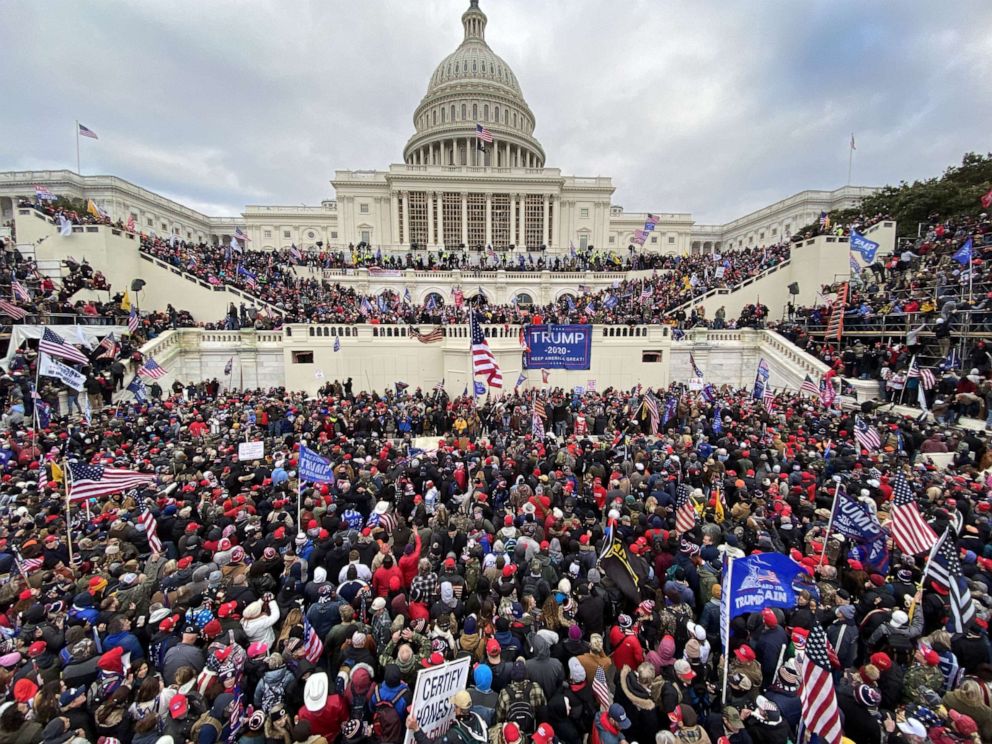
A full year later, Kaine said he still doesn’t know the answer to the question he posed that day.
"We have been under an intense stress test of our democracy," Kaine, D-Va., said in an interview with ABC News. "I can say we have survived it. I can’t yet say we’ve passed it."
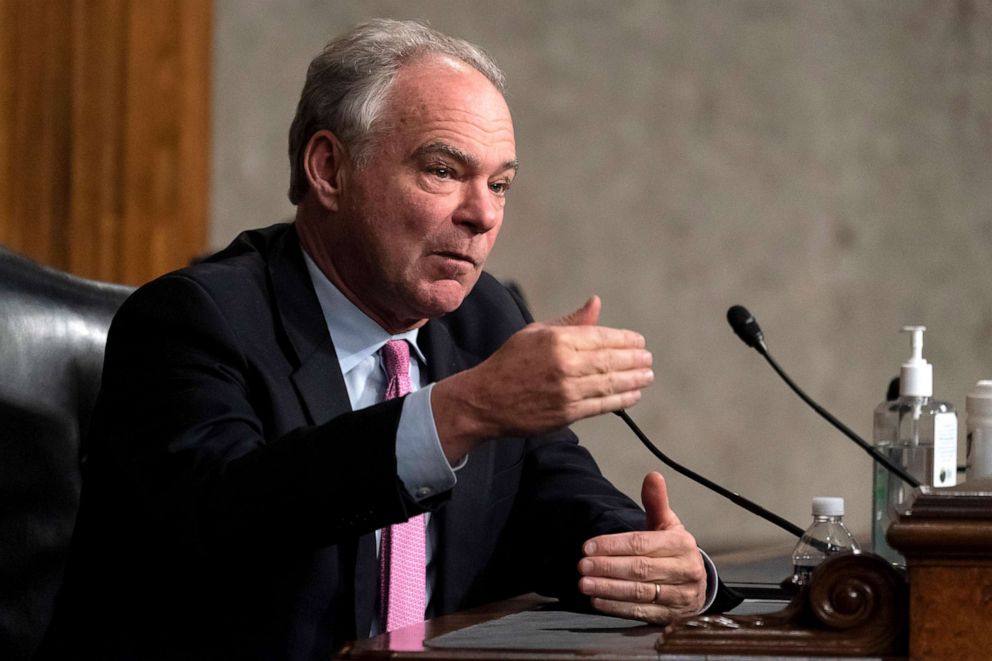
The impact of the assault on the Capitol seemed clearer in the immediate aftermath of Jan. 6. Trump’s false election claims and the violent mob that followed -- plus his failure to quickly try to disperse the crowd -- led to Cabinet resignations, denunciations from virtually all leading elected Republicans and swift and bipartisan impeachment votes.
Yet after a brief period of repudiation, what came next was something of a vindication of the former president and his worldview.

Trump was not proven right on the facts -- not even close, as Trump continues to spread outright lies about the election, and his supporters have sought in vain to prove his false claims. But his longtime strategy of repeating a falsehood often enough and with enough conviction -- of denying realities and making them into something new altogether -- has served to retain if not enhance his political influence.
Regardless of whether Trump run again, many of his followers took his falsehoods and turned them into action. That includes still-ongoing partisan election “audits” designed to undermine trust in voting, new laws restricting voting and even altering election certification mechanisms, and in 2022 candidacies that could impact future elections.
The “big lie” not only stuck around but metastasized, ballooning into what now count as mainstream GOP views about the last election.
An ABC News/Ipsos poll released this week found that seven in 10 Republicans agree with Trump’s false contention that Biden’s victory was illegitimate. And 52% of Republicans said they agree with the notion that rioters at the Capitol were "protecting democracy" more than they were "threatening democracy."
It’s not just in public opinion or in rhetoric that the impact has been felt. According to the nonpartisan Brennan Center for Justice, at least 19 states have passed new laws making it more difficult to vote – laws that were in many cases inspired by falsehoods about 2020.
Even if votes are fully and fairly cast, a range of battleground states have changed the way they certify elections in ways that could make it easier for a future election to be overturned the way Trump demanded.

In Arizona, the GOP legislature took power over election-related lawsuits away from the Democratic secretary of state. Lawmakers in Georgia made it easier for themselves to remove local election officials, while also weakening the powers of their Republican secretary of state, who defied Trump to certify President Joe Biden’s victory.
Republicans have broadly cast the new measures as streamlining and cost-cutting measures that are in keeping with state legislatures’ power to oversee elections. But coming just after Trump’s demands that state lawmakers engage in extra-legal measures to overturn an election, the impact could be significant.
GOP lawmakers have given new powers to "partisan actors who are not part of the election process to access and review ballots and other materials," according to a recent Brennan Center report.
"These reviews have typically been designed to set the stage for future efforts to suppress votes and subvert election outcomes," the report concludes.
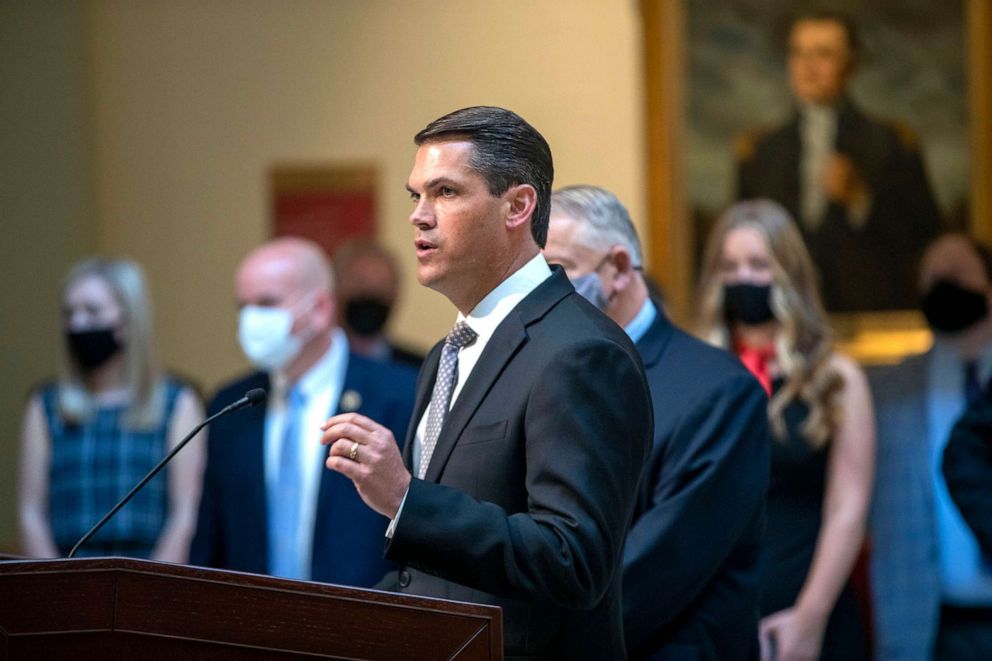
This alarms even some Republicans, who feel the party’s allegiance to Trump and his lies comes at the cost of important discussions about the country’s future.
"I thought we would have moved past this by now,” said Georgia's Republican Lt. Gov. Geoff Duncan, who chose not to run for reelection in 2022 after standing alongside his state’s GOP governor and secretary of state in backing certification of Biden’s win.
"I don’t think history is going to be kind to those folks that just didn’t stand up and say, 'This is wrong,' " Duncan told ABC. "What we’re feeling is the vacuum of leadership inside the Republican Party."
If there is a vacuum in the GOP, Trump loyalists are trying to fill it. In the upcoming elections, at least 15 candidates for statewide office across 12 battleground states have directly challenged the validity of the 2020 election, according to a recent ABC News analysis.
That’s a crop of future potential governors, secretaries of state and attorneys general who could be in a position to service lies about 2024 or beyond.
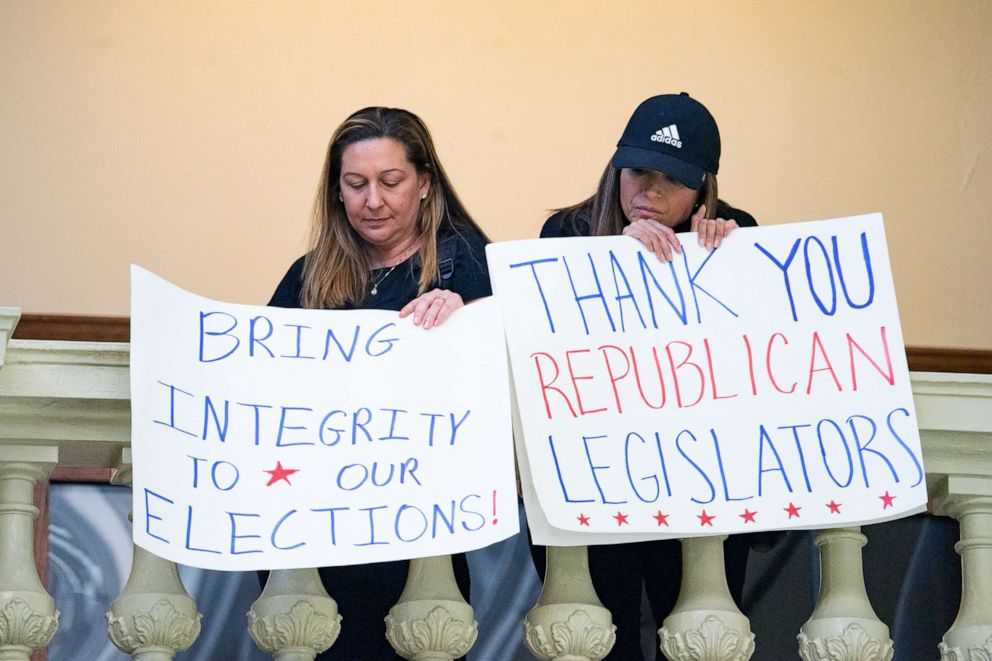
The Trump 'big lie,' that he started before the election, that he ramped up after the election and on Jan. 6, is alive and well in this country.
Kaine said that in his view, the attempt to alter the course of democracy continues, just in more subtle ways than by rioters carrying MAGA flags and wearing white-supremacist T-shirts.
"Jan. 6 was an attack on the Constitution of the U.S. by domestic insurrectionists. That attack is ongoing," he said. "The Trump 'big lie,' that he started before the election, that he ramped up after the election and on Jan. 6, is alive and well in this country."
Far from fading away, Trump himself is doing his best to see to it that Republicans ascribe to his falsehoods. He has helped recruit and has endorsed a range of challengers to GOP lawmakers across the map, driving many who told the truth about the last election into early retirement or into scrambles to save their careers.
What comes next will in part be up to voters. Georgia is where Republicans lost their Senate majority in 2021; coincidentally, the majority-making race was projected by news networks even while the Capitol was still overrun on the afternoon of Jan. 6.
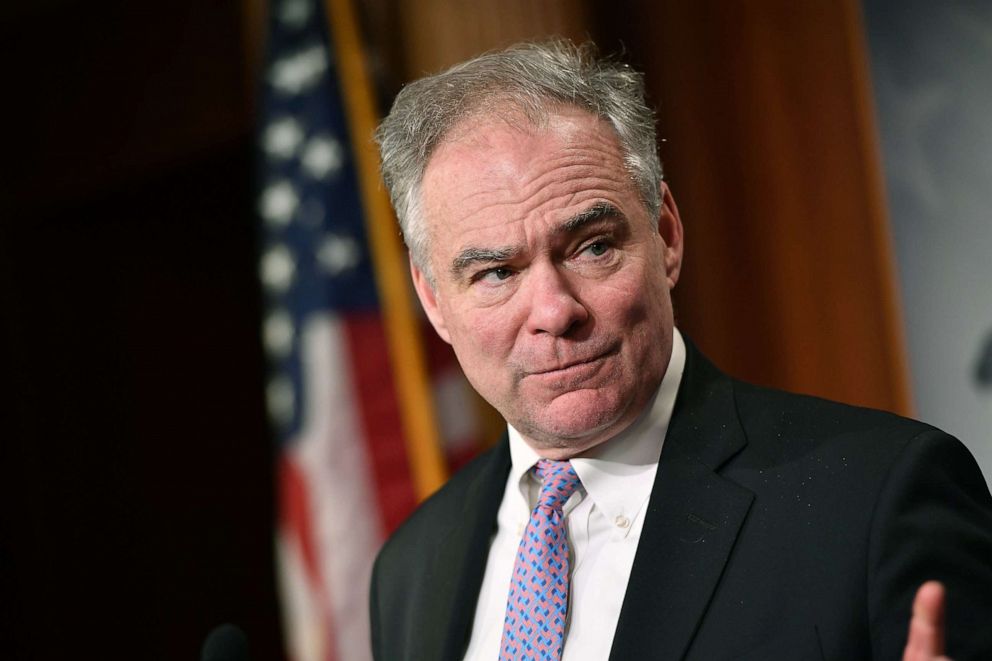
In that same state, Trump is now backing primary challengers against major Republicans who didn’t follow his lies. Some Republicans like Duncan hope races like those will demonstrate for GOP voters the folly of pursuing falsehoods that have the party looking backward and inward.
"I feel like the trajectory is changing," Duncan said. "But there’s still this hanging cloud of conspiracy, of 'rigged elections,' that doesn’t help any Republican winning any election – except maybe a primary. We want to win the whole game."
Kaine and many other Democrats channeled their anger about Jan. 6 into a new push to protect voting rights. Passing those, he said, would help strengthen democracy -- though they have so far been blocked by Republicans in the Senate.
Accountability could also come via the Jan. 6 committee, which is in the midst of a slow-developing investigation that has already produced eye-popping details that complement the considerable public record around that day. Criminal charges pursued by the Biden Justice Department could expand to include political leaders.
Republicans, though, blocked the concept of a bipartisan commission, setting themselves up to attack key findings. One of the committee’s two GOP House members has announced his retirement, while the other – Rep. Liz Cheney, R-Wyo. – lost her spot in leadership and is in danger of losing her job entirely to a Trump-backed primary challenger.
Whether it’s because of -- or in spite of -- Trump, Republicans entered 2022 more optimistic than ever about their chances to regain power. The most likely GOP House speaker would be Rep. Kevin McCarthy, R-Calif., who famously said Trump "bears responsibility" for Jan. 6 yet visited Mar-a-Lago to pay respects to Trump a mere three weeks later.
Trump’s final tweet on Jan. 6 -- he would be permanently banned from the social-media platform a few days later -- ended with an exhortation: "Remember this day forever!"
A year after that horrible day, there’s little danger that it will be forgotten. But its full legacy, like democracy itself, remains a work in progress.




